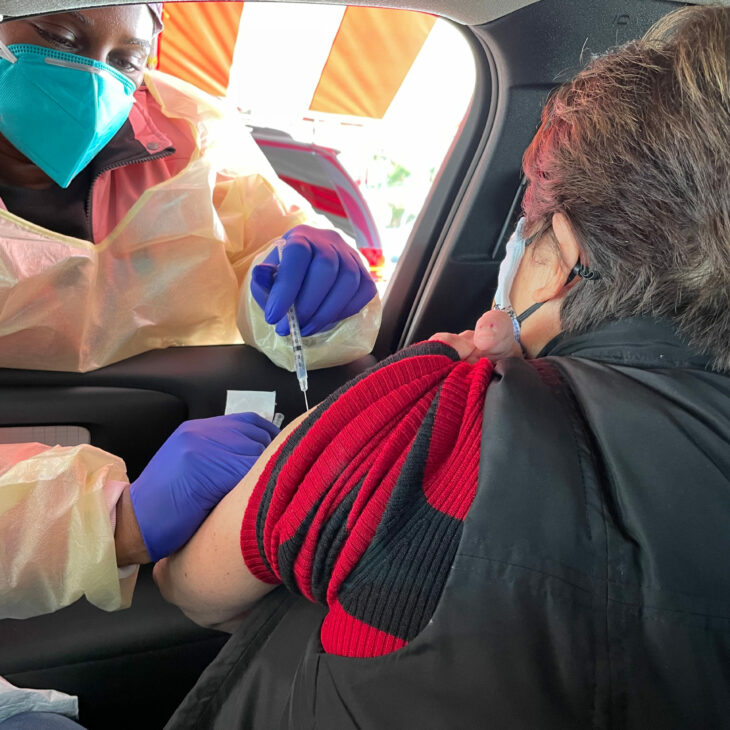“Faith in the Field”: Collective Wisdom for Moving from Vaccine Hesitancy to Uptake
July 29, 2021

“With COVID-19, our people perish from lack of knowledge. Vaccine acceptance is one of the first steps in health equity and moving towards justice.”
As Dr. Tanya Sorrell spoke these words on Wednesday’s webinar releasing new PRRI-IFYC survey findings on vaccine hesitancy and uptake, I was reminded of my June 2021 conversation with Debra Fraser-Howze, founder and president of Choose Healthy Life. Fraser-Howze’s organization fortifies community infrastructure to better address the pandemic in Black communities that have long been plagued by health disparities. When I asked Ms. Fraser-Howze about the goals of hiring “public health navigators” to support vaccine outreach in congregations across seven U.S. cities, she reflected, “We want to go back to normal, but we don’t want to go back to that normal. We died in that normal. And we want to go to a place where we do not die.”
My interview with Ms. Frazer-Howze was one of nine powerful interviews with faith and civic leaders across the United States comprising IFYC’s Faith in the Field series. In each conversation, we explored how these leaders’ communities are experiencing the pandemic, as well as distinct opportunities and challenges in those spaces when it comes to COVID-19 vaccination. In many ways, the wisdom shared through these interviews—mirrored in the PRRI-IFYC data released this week—illuminates the importance of religiously and culturally competent strategies in our ongoing efforts to get people vaccinated.
Read: “People Have Valid Reasons They Distrust”: A Minneapolis Imam Reflects on Vaccine Hesitancy
Make It Familiar
Berto Aguayo’s Back of the Yards neighborhood on Chicago’s South Side was a vaccination desert last spring, so he worked alongside fellow community members to demand vaccines from the city. But having a supply of vaccines wasn’t the same as ensuring easy access for people living in Back of the Yards. Aguayo recognized the importance of reaching out to his neighbors in spaces that felt familiar and safe, so he mobilized area youth through his nonprofit, Increase the Peace, to facilitate vaccine sign-ups online. “We hired some young people and we set up shop at taquerias and laundromats everywhere,” Aguayo shared. “These are people who can navigate the system, get people registered for the vaccine, and meet people where they’re at.”
Make It Easy
At the Hindu Society of North Carolina (HSNC), “making it easy” has been an aim of pandemic response initiatives since March 2020. When I spoke with HSNC members Manoj Pandya and Satish Garimella last spring, they reported 11,000 vaccine shots had been distributed at clinics onsite. “We have 40 to 50 nurses there,” noted Garimella, who oversees the clinics. “Within 10 minutes, you’re out.” In addition to efficiency, hospitality has been a key factor in making vaccination easy. Our interview took place at one of the clinics, and I observed hospitality extended at every turn, from the registration table to food and drink stations for healthcare professionals and patients alike. “HSNC facilities are open to all,” Pandya explained. “The main motive of our founders was to build a center that can assist the community in meeting their religion, educational, social, cultural, spiritual, and family needs.”
Make It Comfortable
In my interview with Dr. Toby Bressler from the Orthodox Jewish Nurses Association (OJNA), we discussed the importance of knowing where people feel comfortable getting information and ensuring accurate, accessible vaccine resources are available there. In New York, popular Jewish radio stations and Yiddish newspapers were central to OJNA’s vaccine outreach efforts. Bressler also cited trusted thought leaders as vital resources. “We recently had a vaccine event that included a rabbi from Israel and a local physician here in the U.S.,” Bressler noted. “There was a Q & A session, and the panelists were able to answer in a way that was meaningful because they were from the Jewish community.”
Read: Is Social Encouragement the Key to Increasing Vaccination Among Evangelicals?
Beyond offering real-world examples of how to make COVID-19 vaccination familiar, easy, and comfortable, Faith in the Field interviews remind us how faith has been a deep well of strength for Americans over the past 18 months—as well motivation for people of many different faiths to get vaccinated. Anthony Cruz Pantojas, who co-chairs the Latinx Humanist Alliance, spoke about vaccination as “an ethical or moral obligation” in his tradition, in which “human liberation from social inequality” is pursued. Chairwoman Gwendena Lee-Gatewood of the White Mountain Apache Tribe described how her faith has inspired hope despite the heartache of the past year: “We come from a great people. We are people who never gave up when they had adversity. And it reaffirms our faith in our Creator, it reaffirms you can make it through the tough times together, working together.”
Read: For Catholics, Getting Vaccinated is an Act of Charity
Overcoming COVID-19 undoubtedly requires high-caliber research that points us toward the communities where vaccine outreach is most needed. Survey findings like those PRRI and IFYC released this week equip us with tools we can use to strategically encourage and facilitate vaccination. But overcoming COVID-19 also requires an army of volunteers who are willing to take action in the fight against the virus. Stories like those captured through Faith in the Field inspire action by reminding us that ordinary people are doing extraordinary things within their spheres of influence to combat the pandemic. What’s stopping you from doing the same?
To learn more about IA and PRRI’s national research efforts, or to see how you can get involved in our vaccine outreach efforts, please click here.
Share
Related Articles



